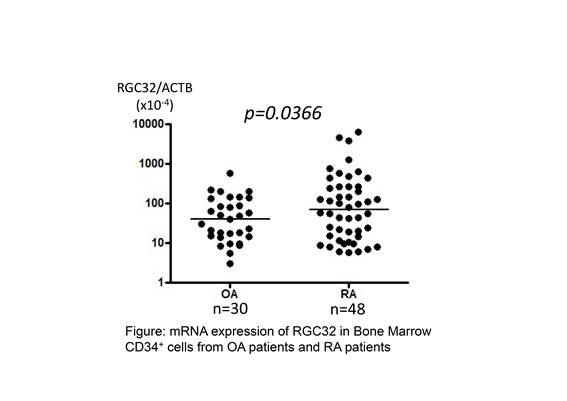Session Information
Date: Monday, November 14, 2016
Title: Rheumatoid Arthritis – Human Etiology and Pathogenesis - Poster II
Session Type: ACR Poster Session B
Session Time: 9:00AM-11:00AM
Background/Purpose: Rheumatoid arthritis (RA) is a chronic inflammatory disease characterized by hyperplasia of synovial lining cells, consisting of macrophage-like type A synoviocytes and fibroblast-like type B synoviocytes. It has been appreciated that type A synoviocytes, which are also called intimal macrophages, are derived from monocyte precursors in the bone marrow (BM). Previous studies showed the accelerated generation of monocyte-lineage cells from BM progenitor cells in RA. Of note, recent studies have demonstrated that response gene to complement 32 (RGC32) is a novel membrane regulator for macrophage phagocytosis. It has been well appreciated that synovial macrophages as well as peripheral blood monocytes have enhanced capacities of phagocytosis. It is thus possible that abnormal expression of RGC32 genes in the BM might be involved in the enhanced phagocytosis of monocytes and macrophages. The current study therefore examined the mRNA expression of RGC32 in BM CD34+ cells from RA patients.
Methods: BM samples were obtained from 48 patients with RA (6 males and 42 females: mean age 58.6 years) and 31 patients with OA (3 males and 28 females: mean age 71.1 years), who gave informed consent, during joint operations via aspiration from iliac crest. CD34+ cells were purified from the BM mononuclear cells by positive selection with magnetic beads. The expression of mRNA for RGC32 was examined by quantitative reverse transcription PCR. The results are shown as the ratio of the copy numbers to those of b-actin mRNA.
Results: The expression of mRNA for RGC32 was significantly higher in RA BM CD34+ cells than OA BM CD34+ cells (Figure). The mRNA expression levels of RGC32 were not correlated with serum C-reactive protein. There were no significant differences in RGC32 mRNA expression between RA patients with MTX and those without MTX (p=0.4788) or between RA patients with oral steroids and those without oral steroids (p=0.0607). RGC32 mRNA expression was significantly correlated with nuclear factor-kappa B1 (NFkB1) (p<0.0001, r=0.5550) gene expression in RA BM CD34+ cells.
Conclusion: These results indicate that the enhanced expression of RGC32 mRNA in BM CD34+ cells plays a pivotal role in the pathogenesis of RA through upregulation of phagocytosis capacities of peripheral blood monocytes and synovial macrophages. Moreover, the data also suggest that the enhanced RGC32 mRNA expression might be closely associated with mRNA expression of NFkB1.
To cite this abstract in AMA style:
Matsueda Y, Nagai T, Tomita T, Yoshikawa H, Tanaka S, Hirohata S. Enhanced Expression of mRNA for Response Gene to Complement 32 in CD34+ Cells of the Bone Marrow in Rheumatoid Arthritis [abstract]. Arthritis Rheumatol. 2016; 68 (suppl 10). https://acrabstracts.org/abstract/enhanced-expression-of-mrna-for-response-gene-to-complement-32-in-cd34-cells-of-the-bone-marrow-in-rheumatoid-arthritis/. Accessed .« Back to 2016 ACR/ARHP Annual Meeting
ACR Meeting Abstracts - https://acrabstracts.org/abstract/enhanced-expression-of-mrna-for-response-gene-to-complement-32-in-cd34-cells-of-the-bone-marrow-in-rheumatoid-arthritis/

